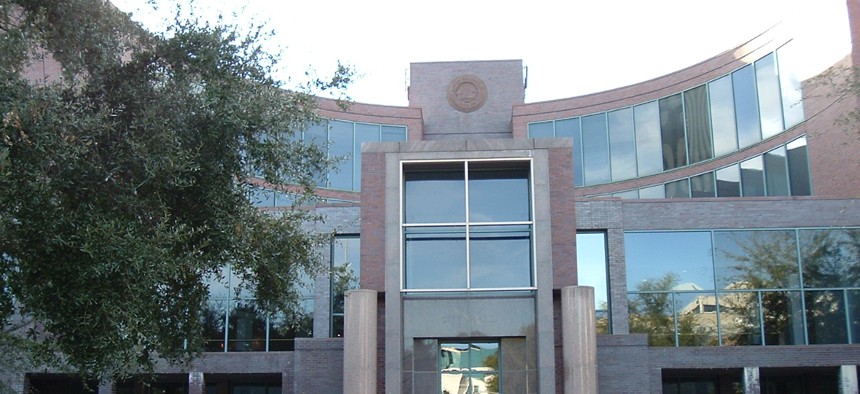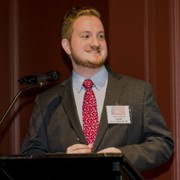Politics
In the dark? With private talk, Tallahassee mayor, city commissioner may have broken Florida’s ‘Sunshine Law,’ fellow official says
Possible ‘secret meeting’ at issue, with millions of public dollars at stake in controversial request from politically connected developer.

Tallahassee City Hall via Wikimedia Commons
The mayor of Florida's capital and one of its city commissioners may have broken the state's open government laws by meeting privately to discuss a politically-connected developer’s request for nearly $2 million in public funding.
That’s the accusation from fellow Tallahassee City Commissioner Jeremy Matlow, who disclosed the meeting in a Tuesday social media post that racked up nearly 25,000 views by Wednesday afternoon.
“Just walked into Commission Offices and Mayor (John) Dailey is in Commissioner (Curtis) Richardson’s office discussing an upcoming Blueprint item,” Matlow posted on X, the social media platform formerly known as Twitter. “ ‘Bugra is under an NDA with OEV. His documents were marked confidential. Someone messed up.’ ”
“Bugra” refers to local developer Bugra Demirel, NDA means non-disclosure agreement and OEV refers to the Office of Economic Vitality, a joint Tallahassee-Leon County economic development organization.
But whatever the details of the deal they discussed, the state’s open meetings statute – part of what are referred to as the “Sunshine Law” – generally requires meetings of public officials considering official business to be open to the public. “Reasonable notice” of such meetings must be provided. And what are termed “secret meetings” are actually a crime.

Dailey, Richardson and Matlow all sit on the board of the Blueprint Intergovernmental Agency, which consists of Tallahassee and Leon County commissioners and reviews and funds “major infrastructure projects” with money that comes from a local 1% sales tax. The Blueprint board provides direction to the agency and to the Office of Economic Vitality; a vote to approve Demirel’s request for $1.8 million to finish his project is set for today.
Demirel has been trying to build the SoMo Walls retail project along a stretch of South Monroe Street, considered a gateway to the city’s south side and not far from the state Capitol. OEV staff already has recommended the money be approved for the project being developed by Demirel's company, Cascades Garden LLC.
Attorney General’s opinions: ‘Secret meetings’ undermine open government
Legal opinions from the Attorney General’s office dating back to the 1970s have said private get-togethers of two or more members of an elected board or panel may be “secret meetings” forbidden under the law.
“A ‘secret meeting’ occurs when public officials meet at a time and place to avoid being seen or heard by the public for the purpose of transacting or deliberating upon official business,” one opinion says. “ ‘(C)onversations bearing on the public's business’ should be open to the public and the press.”
The question now is whether Dailey’s and Richardson’s conversation constitutes a “secret meeting,” which could be grounds for a second-degree misdemeanor, punishable by up to 60 days in jail and a $500 fine. Both men have not responded to City & State’s request for comment, nor have they responded to a request from the local newspaper, the Tallahassee Democrat.
Elected officials in Florida, when first taking office and afterward, are supposed to take trainings in how to follow the Sunshine Law. Dailey has been in office for the last 17 years, starting as a Leon County commissioner; Richardson has been an elected officeholder for 23 of the last 33 years, including eight in the Florida House.
Ben Wilcox, research director for the government accountability group Integrity Florida, said it would be a violation of the law if Matlow’s account of the meeting holds up. “Local government officials are prohibited from meeting to discuss an agenda item outside of the meeting where the agenda item is scheduled to be discussed,” he told City & State.
Wilcox explained that a proven violation could result in a board’s later action being voided. Violators may even be removed from office.
In an interview with City & State, Matlow said he believes Dailey was speaking with Richardson to lobby his vote. “I think John Dailey had information he thought could influence Commissioner Richardson’s vote, and I think he went to his office to share information he didn’t want to talk about in a public meeting to gain Richardson’s support for his campaign consultant’s project,” he said, referring to Demirel.
Developer asking for money has political connections to elected officials
Demirel has connections to both Dailey and Richardson: He chairs the Grow Tallahassee political committee, which endorsed and made donations to Dailey’s 2022 campaign and Richardson’s 2020 campaign. Most members of the Blueprint board have been backed by Grow Tallahassee in the past. The PAC also backed a candidate against Matlow in 2022.
To be sure, Matlow has been a frequent critic of Grow Tallahassee, Demirel and Dailey. He raised concerns about the current funding request before coming forward about the potential Sunshine Law violation.
In a Wednesday press conference, he pointed out that the project is already slated to receive $776,000 in Community Redevelopment Agency funds, and the latest $1.8 million ask comes after the project is running over budget, not meeting development goals, and has been unable to secure a bank loan to make up the difference.
He suggested politics could be driving the request, not policy. “All the commissioners coming out in support have personal ties with the person applying for it,” Matlow said.
In an interview with the Democrat, however, Demirel defended the project. SoMo Walls’ “substantial $11 million capital investment represents a significant economic opportunity for the south side. The project will continue to create jobs, boost property values, upgrade public infrastructure, stimulate commercial activity, enhance community development and improve quality of life on the south side,” he told the Democrat.
What’s next: The Blueprint board meeting in which Demirel’s funding request will be discussed is today, at Tallahassee City Hall, starting at 3 p.m.
Jim Rosica contributed. Contact Tristan Wood at twood@cityandstatefl.com and follow him on X: @TristanDWood.
